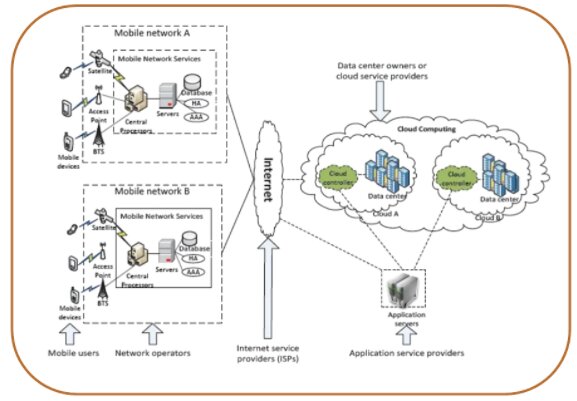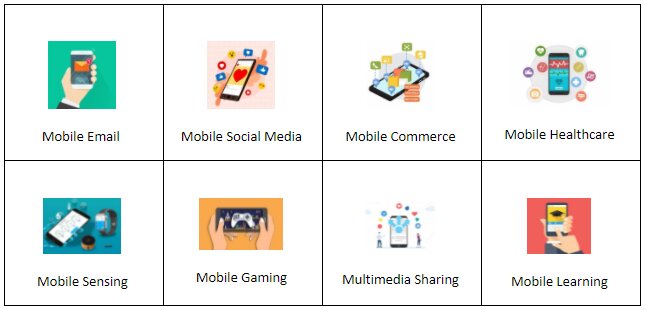Introduction To Mobile Cloud Computing
You’re likely familiar with the concept of cloud computing (unless you’ve been living under a rock :P). However, are you familiar with mobile cloud computing aka MCC?
Combining cloud computing with mobile technology allows for the delivery of powerful processing resources to you; a mobile consumer. You need to have an Internet connection to view your cloud-based data, but your Internet connection’s speed is very important. Instead of being tethered to your desktop computer, mobile cloud computing allows you to operate apps when you are walking down the street or waiting in line at the cashier.
Businesses may be considering opportunities given the growth of mobile clouds and the power of mobile computing. By 2026, it is anticipated that the mobile cloud market would total a staggering $118.7 billion. In this article, we will learn about MCC by going through the following topics-
- What is Mobile Cloud Computing and how does it work?
- What are the applications of Mobile Cloud Computing?
- What are the benefits of using Mobile Cloud Computing?
- What are the challenges of using Mobile Cloud Computing?
- Why is MCC the future of mobile app development?
What is Mobile Cloud Computing and how does it work?
Cloud computing is used by mobile cloud computing to send applications to mobile devices. The term “mobile cloud” describes cloud-based information as well as mobile-optimized software and services. It mixes cloud-based services with mobile application development to enable the delivery of cloud services and apps to mobile customers. A software application that seamlessly integrates local and cloud-based components are known as a custom mobile cloud app. Rich mobile apps may be run across many mobile devices thanks to the convergence of cloud computing, mobile computing, and wireless networks.
Now let us understand how all this works-
- As you can see in the image below mobile devices are connected to the mobile networks via base stations that establish and control the connections and functional interfaces between the mobile network and mobile devices.
- The mobile users’ requests and information are transmitted to the central processors that are connected to the servers providing the mobile network services.
- Requests from subscribers are sent over the Internet to a cloud.
- The apps run from remote data centers where data is stored and processed.
- In the cloud, cloud controllers process the request to provide mobile users with the corresponding cloud services.
Best-suited Cloud Computing courses for you
Learn Cloud Computing with these high-rated online courses
What are the applications of Mobile Cloud Computing?
A software application known as a mobile cloud app is made to be accessed online using mobile devices.
- Mobile Email-
This is a typical illustration that is frequently used. Examples of mobile email include Gmail, Outlook, and Yahoo Mail. You use mobile cloud technology when you check your emails on a mobile device.
- Mobile Social media-
Real-time data sharing is possible via mobile social networking, whether it be through Facebook, Instagram, or Twitter. A mobile user, for instance, can store data and send films to other users.
- Mobile Commerce-
Do you utilize a mobile e-commerce or banking app? You use mobile cloud computing if the answer is yes. Scalable processing power is used in mobile commerce (MCC).
- Mobile Healthcare-
MCC enables mobile device access to enormous amounts of real-time data storage in the cloud for mobile healthcare. For instance, accessing patient details while on the go is quick and simple.
- Mobile Sensing-
The majority of us own smartwatches these days, and we have applications on our phones that let us connect to them and monitor their data.
- Mobile Gaming-
In mobile gaming, players solely use their device’s screen interface to interact with the games they are playing.
- Multimedia Sharing-
From the name alone, it is clear that this aids in data transfer between mobile devices. Users of mobile devices can exchange any kind of data. Again, MCC aids in security and data sharing of all kinds.
- Mobile Learning-
All cell phones are used in mobile learning. Many schools are recommending mobile learning these days. Students can use the resources that teachers put in the applications to study for exams, and they can also save any videos or images that are included.
Let’s move on to discussing the benefits of the mobile cloud.
You can also explore: Introduction to cloud computing
What are the benefits of using Mobile Cloud Computing?
Now it’s time for a more thorough explanation of a few benefits of cloud computing, let us check them out-
- Speed and adaptability-
Software companies may generate and share resources for mobile apps with users thanks to mobile cloud computing capabilities. As a result, programmers may create and update programs considerably more quickly to meet consumers’ constantly changing needs.
- Shared resources-
No processing or storage restrictions placed by the mobile device apply to mobile apps running in the cloud. Because it is located in the cloud, even a data-intensive operation can now be used on a mobile device.
- Data integration-
Utilizing integrated data, mobile cloud computing enables users to swiftly and securely collect data from many sources and integrate it.
- Improved digital services-
The processing power and data storage capabilities of applications created using mobile cloud architectures are greater. They typically operate more effectively and prolong battery life. Additionally, they were created using cutting-edge technology that is simpler to use and integrate.
Mobile apps created for and in the cloud are more scalable and reliable than other cloud-based applications. They benefit from the extraordinary level of data security implemented by cloud computing companies, are simpler to maintain, and utilize less power from user devices.
You can also explore: Evolution of cloud computing
What are the challenges of using Mobile Cloud Computing?
Unquestionably, there are advantages to mobile clouds. But do development teams face any difficulties as a result of this technology? Of course, they do! The following difficulties should be considered before making a mobile cloud investment:
Issues with connectivity and performance-
Mobile apps must be accessible across open networks because they are stored on distant servers. Additionally, in some places, network connectivity might become a difficulty. As a result, the program can respond slowly and slow down.
Another issue that could be straining the connection between mobile and cloud endpoints is increased mobile data traffic.
Battery life-
Batteries in mobile devices are quite simple to deplete. Additionally, heavy network usage significantly reduces battery life. Although the bulk of the processing is done in the cloud, the device still needs a strong battery to access programs and carry out other functions.
Support for various platform types-
Given the variety of mobile platforms the cloud infrastructure needs to handle, the integration support could prove to be expensive to design. Each mobile platform has specific network connection requirements. Supporting many platforms is crucial because this is what consumers today demand from businesses.
Heavily dependent on network bandwidth-
If there are problems with network connectivity, applications may operate slowly or with restricted functionality. Although these problems are rare given the expanding wireless infrastructure, they are nonetheless possible.
Security Issues-
The security issues that arise with cloud computing are all related to MCC. For individual mobile devices, the security algorithms that safeguard cloud infrastructure are too sophisticated.
Think of this example:
A particularly handy digital product is an application that locates restaurants in the area. But will the business that manages that application sell data about customer searches to other companies? To deliver outstanding performance, mobile cloud applications must be completely secured.
Applications running on mobile clouds must be sufficiently protected to reduce hazards brought on by user actions. Pick a trustworthy cloud service provider who will keep your data safe and secure when choosing a vendor.
Why is MCC the future of mobile app development?
Cloud computing is a phrase that is frequently used in web development. However, it is not just for web development. And one such improvement to the creation of mobile applications is mobile cloud computing. It has altered the current mobile phone landscape. Technology is advancing for both Android and iOS as a result of the growing use of smartphones. Here are a few reasons why-
You can also explore: Introduction to Cloud Computing Deployment Models
- Real-time Data Access-
Data is practically instantly updated. Team members and team leaders have access to the most up-to-date and accurate information imaginable.
- Disaster Recovery-
The cloud provider’s actual data centers house information in numerous locations, making disaster recovery quick and simple. Users will be automatically directed to any available services offered by the vendor if there is any disruption to the service itself. As a result, there will be less downtime for users and business continuity.
- Support for several platforms-
Multiple cloud platforms can be used for development thanks to mobile cloud computing. Users are not restricted to a particular cloud platform. Organizations become more agile as a result of this. It enables developers to target a wider market niche.
- Cost Effectiveness-
MCC doesn’t demand a sizable upfront sum of money. IT requires no initial outlay of funds. Costs for hardware are decreased. Mobile devices with lower specs will be equally accessible and readily available. Therefore, businesses do not need to be concerned about rising user fees.
Pay-as-you-go is the norm for cloud providers’ services. Businesses only spend what they use. In addition to being energy-efficient, this model has lower costs.
In a nutshell
Cloud computing on the go is an effective tool for business. It has numerous applications and employs cloud computing to deliver services to mobile devices. Email, social media, and commerce are their common uses.
Real-time, cost-effective, and flexible- MCC offers several advantages. It has drawbacks as well, such as concerns about privacy and security.
Whatever the case, MCC is unquestionably here to stay and to grow.
This is a collection of insightful articles from domain experts in the fields of Cloud Computing, DevOps, AWS, Data Science, Machine Learning, AI, and Natural Language Processing. The range of topics caters to upski... Read Full Bio





